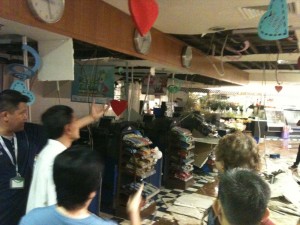Focus on Floods – 5 key questions

I was woken up by thunder at 6:30 AM this morning. It soon became obvious that it would be a busy day. I couldn’t turn right from Farrer Road to Bukit Timah Road due to the flood and another car was stuck in front. I had to take a detour over the Lornie Road flyover and PIE to ultimately reach the MEWR Building.
When I arrived at the PUB Ops Room, they told me that the storm was even worse than last year, and there were floods in MacPherson, Balestier, Bukit Timah and Tanglin areas. In one morning, a 124 mm of rain had fallen in the central areas of Singapore – this is almost 80% of the usual rainfall for the whole month of June. In fact, more than half of the total, 65 mm, had fallen within half an hour.
After touring some affected buildings (the worst affected was Tanglin Mall), I met the press to share my preliminary thoughts on the issue of flooding. Preliminary because I have only been two weeks on the job, and I am not an engineer.
There are five key questions:
Has the weather in Singapore changed?
This is not an easy question to answer. The meteorologists tell me that they need more long term data before they can give us a conclusive answer. However, the successive incidents of higher and more intense rainfall over the past few years certainly raises this probability. In any event, we don’t have the luxury to wait for complete answers before taking action. Hence, I intend to work on the presumption that our weather has changed. With global warming, and high evaporation, we should also expect greater rainfall, especially in the tropics. If so, then we should be psychologically and practically prepared for even more intense storms in the future.
Do our planning norms need to be revised?
The PUB has done a great job over the past five decades. In fact the professionals have been so successful that floods became almost a rarity until recently. Nevertheless, if the weather patterns have changed, then PUB needs to review all the assumptions and planning norms that underlie our current drainage plans. If we need to do more, then we will have to find the resources and invest in the appropriate infrastructure.
How can we best secure the safety of the public?
Whilst analysis and plans will take time, we must take urgent action to secure safety. The recent tragedy in Mandalay Road was a stark reminder. That is why I have asked PUB to systematically review every single flood prone area and take all necessary action to ensure public safety. There must be done urgently and comprehensively. Singaporeans can also help by highlighting areas and suggestions to the PUB.
How can we keep our roads passable to traffic despite heavy rain?
PUB and LTA need to work more closely to study the engineering aspects of our roads and drainage systems. They are interlinked, and require joint expertise.
How can we better protect buildings so that businesses and other activities are not disrupted?
I saw first hand the damage that a flood can wreak on businesses and other activities within buildings. Tanglin Mall has never had a serious flood since it was built 15 years ago. Unfortunately, the deluge of water today overcame the precautions they took, and the drainage pumps subsequently failed leaving the building defenceless. PUB, BCA and building owners will have to take professional advice on additional measures that are necessary. Perhaps we need to take a risk based approach, based on the location of the buildings – some buildings may require additional precautions and backup systems.
Conclusion
We are dealing with Nature, and Man needs to be humble when addressing the challenges that Nature poses. There will always be uncertainty, and sometimes despite our best efforts, we cannot win. We will be open and transparent. We will share as much data in real time as possible so that solutions and precautions can be devised for the immediate and long term.
A resident posted on the Holland Bukit Timah facebook wall that “It is nothing too difficult to solve”. I’m afraid it is actually quite difficult to solve. Therefore I cannot guarantee outcomes.
My colleagues and I will do our best. I can assure Singaporeans that flood prevention will be high up on my list of priorities.